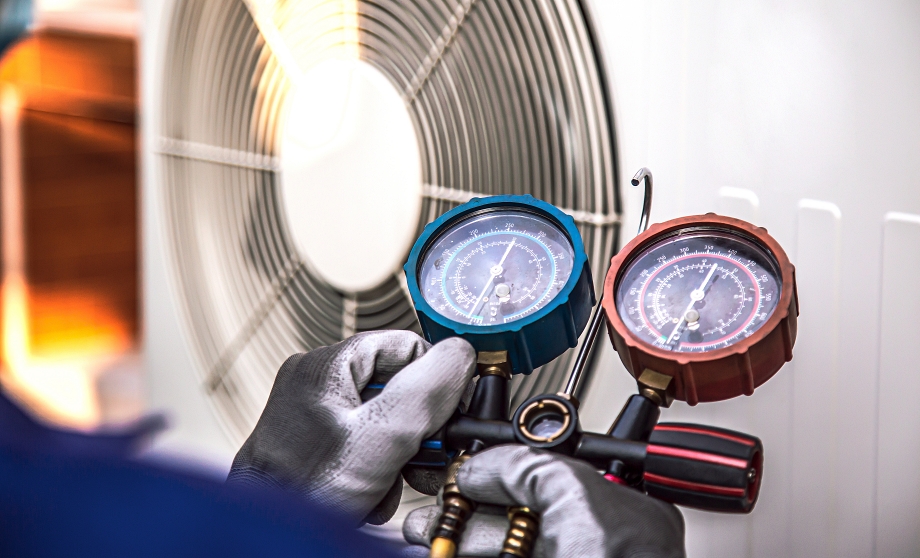
The construction industry is booming for both new construction and upgrading projects. HVAC technicians play a significant role in this industry by servicing and maintaining heating, ventilation, and cooling equipment and systems in homes and businesses. Many jobs are available for those trained in strong HVAC certificate programs. Earning a certificate is the gateway to high-paying jobs. Contact ITI Technical College today for more information about our programs.
What A Certificate In HVAC Is All About
Graduates with certificates in HVAC are prepared to obtain entry-level positions as service and maintenance technicians. They are trained in general heating, ventilation, and air conditioning work for residential and basic commercial applications. Their training programs provide knowledge and skills in air handling equipment, heating and cooling systems, recovery, recycling, electrical wiring, and necessary controls.
Holding a certificate demonstrates that a technician has passed all local and state examinations to quality to perform HVAC services. Technicians typically work as assistants under the supervision of a senior technician. Once they have achieved the necessary competence and months of experience, they can go out on calls by themselves.
Earning an HVAC Certificate is the fast track to find employment in this industry. Most training programs can be completed in one year or less.
Demand Is High For HVAC Graduates
 According to the U.S. Bureau of Labor Statistics, employment for HVAC technicians is projected to grow 9% from 2023 to 2033 which is much faster than the average of all occupations. Other attractions for job seekers to this industry include:
According to the U.S. Bureau of Labor Statistics, employment for HVAC technicians is projected to grow 9% from 2023 to 2033 which is much faster than the average of all occupations. Other attractions for job seekers to this industry include:
- About 42,500 openings are projected each year
- Many older technicians are retiring which opens up jobs
- The 2023 median annual pay was $57,300
- The hourly median pay in 2023 was $27.55
- 441,200 HVAC technicians were employed in 2023
- Residential, commercial, and industrial jobs are available
- Employment varies from city to city and state to state
- There will be opportunities for advancement with training and experience
|
“HVAC technicians play a significant role in this industry by servicing and maintaining heating and cooling equipment and systems in homes and businesses.” |
What You Learn in A Certificate In HVAC Program
Students are exposed to an intensive study of the HVAC industry. They experience a solid foundation of training in skills and knowledge to work in entry-level positions. The training program is typically completed in one year or less. Students learn to work with the fundamentals of heat transfer, air conditioning, safe work practices, electricity, and the regulations governing the use of these systems. The program components include:
- Students are trained in AC load calculations
- Application and troubleshooting of refrigeration and air conditioning systems
- Success skills and mathematics review related to the HVAC industry
- The National Electric Code (NEC) and all-weather systems
- Intro to PC Office applications and programmable logic controllers
- Heat pumps, wiring methods, electrical safety, and testing
- Automatic controls and electric motors
- HVAC certification exams are given during the program to allow the student to obtain industry competencies in the area of HVAC
NOTE for ITI Technical College students: The 72.5 QCH earned in this certificate program will apply toward an Associate in Occupational Studies (AOS) Degree in Air Conditioning, Refrigeration, & Electrical Technology.
Jobs For Graduates With A Certificate In HVAC
 The HVAC industry is not static like some that are downsizing their workforces. The boom in the construction industry has opened the doors for thousands of new technicians nationwide. These positions are typical for beginning technicians and those moving “up the ladder.”
The HVAC industry is not static like some that are downsizing their workforces. The boom in the construction industry has opened the doors for thousands of new technicians nationwide. These positions are typical for beginning technicians and those moving “up the ladder.”
- Service Technicians diagnose equipment and systems to determine if they are functioning properly, and report any problems to supervisors. They repair or replace any faulty components.
- Ductwork Installers put ductwork into place so that heating and cooling airflow functions correctly without any leaks or obstructions.
- Ventilation Installers also install ductwork, fans, and other ventilator equipment for correct heating and cooling airflow.
- HVAC Maintenance Electricians repair or replace any wiring problems throughout the HVAC system.
- HVAC System Sales Technicians take customer queries and make telephone or in-person retail or wholesale sales.
- HVAC Contract Sales Technicians sell annual maintenance contracts to customers in person or on the phone.
- Electrical Sales Technicians sell components for many different types of equipment and wiring systems in retail and wholesale settings.
Learn More About This Exciting Career
It’s easy to learn more about HVAC training, certificates, jobs, and careers by requesting information from ITI Technical College in Baton Rouge. We have trained thousands of technical graduates since 1973, and you could be one of them.
For more information about graduation rates, the median debt of students who completed the program, and other important information, please visit our website: https://iticollege.edu/disclosures/




